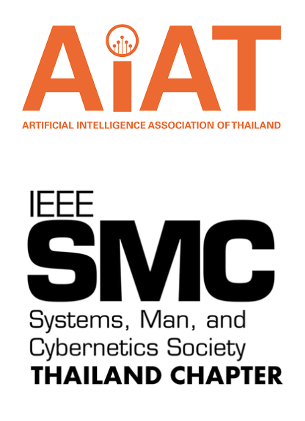Fundamental Study of Key Factors Promoting Smooth Penetration of AI using Analogue Business Games
DOI:
https://doi.org/10.14456/jiist.2017.4Keywords:
Automated driving system, Coexistence, Human satisfaction, Analogue game, BASE business gamesAbstract
In recent years, many companies have researched and developed vehicles that offer automated driving. The newly developed vehicles have numerous sensors, cameras, and AI features. These semi-automated driving vehicles might become very popular during the next decade. In the future, as often seen in movies and cartoons, all vehicles might become connected to traffic control systems operated by public organizations. For promoting smooth penetration of the system, the system might adjust coexistence of the most suitable traffic control and the human satisfaction. However, the authors conducted lectures using analogue business games, which are BASE business games, for lectures at the School of Management Technology (MT) of the Sirindhorn International Institute of Technology (SIIT), Thammasat University since 2013. For this study, the authors attempt to consider similarity between a society with fully automated driving systems and lectures using analogue business games. Furthermore, the authors analyzed student responses to a questionnaire from coexistence of systems and human satisfaction perspectives. Then they clarify key factors promoting smooth penetration of AI.
References
Osamu Tsukada, Ichiro Yamada, “Employee Satisfaction at Toyota Dealers in Shikoku, Japan: A View of the Service Profit Chain”, Transactions of the Academic Association for Organizational Science, Vol. 3, No. 1, pp. 93-98 (2014)
Jun Usuki, Teruo Takahashi, Masatoshi Kitaoka, “Measurement of Introduction for Computerised Vehicle Routing and Scheduling Systems”, Journal of Japan Logistics Society, Vol. 1999 No. 7, pp. 116-128 (1999)
Gregory H. Patton, Daniel Cochece Davis and Gita Govahi,” Predictive Models of Learning: Participant Satisfaction of Experimental Exercises in Business Education”, Developments in Business Simulations and Experiential Learning, Vol. 25 (1998)
E. Nick Maddox, Carolyn Y. Nicholson,” “The Business Student Satisfaction Inventory (BSSI): Development and Validation of a Global Measure of Student Satisfaction”, Developments in Business Simulations and Experiential Learning, Vol. 35 (2008)
Ryoju Hamada, Masahiro Hiji, Tomomi Kaneko, “Development of Software Engineering Business Board Game”, Developments in Business Simulation and Experiential Learning, Vol. 41 (2014)
Tomomi Kaneko, Ryoju Hamada, Masahiro Hiji, “Study of attractiveness of bidding exercise to find one value of Analog Business Games”, Proceedings of the 46th International Simulation And Gaming Association Annual Conference, pp. 17 (2015)




